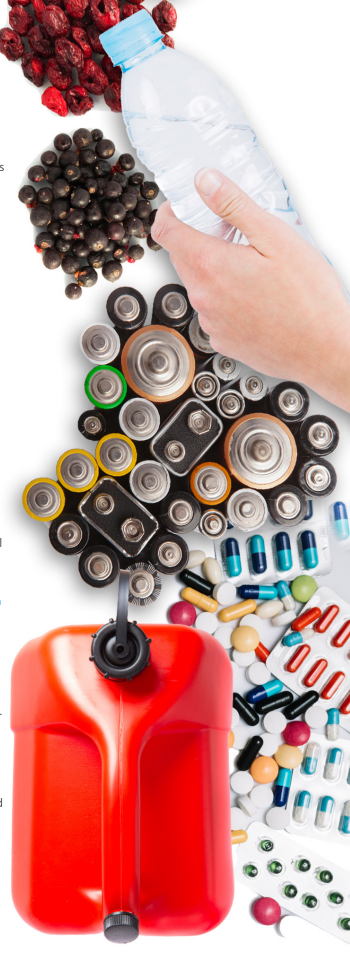Over the years, I have been slowly amassing a good assortment of supplies that will keep my family warm, fed, and as close to normal as possible in the event the lights go out. My blueprint as of now depends mainly on the event that put the lights out to be over in about two months. What happens when the lights don’t come back on? What goods will I need? What will run out first, and if they do, how will I replace them?
I recently read a quote; “Necessity turns the lion into a sheep.” You need to be on top of the barter, not the bottom. If you are trading out of desperation, you are clearly the sheep of the trade and will most likely be taken advantage of. There needs to be a careful process of not only what you will need, but what you should buy now to build a bartering inventory.

How Bartering Commences
In a scenario where there is a disruption either in utilities, the worth of the U.S. dollar, or the rule of law, trading for goods or services will commence almost as fast as the event started.
We have seen this in the aftermath of hurricanes, ice storms, or other disasters where people who have hoarded goods or happen to have a good stock of items everybody wants will set up shop and start to sell, always at highly elevated prices. It is so typical that most states along the eastern seaboard have laws protecting consumers from price gouging for goods, including fuel. Even still, in almost every disaster I have responded to, these are the folks that are out as soon as travel is safe, gouging others who are in need for their own financial gain. These are the people we will have to watch very carefully when the restoration of normality does not return quickly.
During the last long-term power outage we experienced, I recall sitting at the house for just a few days before getting antsy. I had to get to town to just check things out and see what was going on, maybe also pick up some supplies where I could.
Driving through my community, I actually saw folks open carrying firearms, including AR platforms, around town. I realized quickly that Americans, especially in rural areas, can be very distrusting and ready to get their gun off at a moment’s notice. It wouldn’t take much to kick off a two-way gun range. I can only imagine how edgy people will be when something more permanent than an ice storm keeps us hemmed up for weeks on end, and supplies start to run low.
I have a family of five: my wife and myself along with three daughters. A week going without power, open grocery stores, and all-around normality will test not only patience but also how well you have planned for this event. For the goal of being self-sufficient, I found some significant holes in the planning process of my stores and supplies. Some of the items I never imagined being crucial, were, in fact, more like critical needs that I omitted from my plan. The fact that I had omitted them means I had to go out and try to find them through trade.
This leads to another shortfall in my planning; I had no real bartering inventory that was disposable. Between these two omissions, I was going to be at the bottom of the barter in terms of negotiation power at the onset. Since then, I have started to build a decent cache of goods based on my last experience.
This list is only a suggestion and what I currently try to buy in larger quantities on normal grocery store runs.
Dry Goods
This encompasses not only spices, sugar, salt, and flour, but also beans, rice, and grains. Dry goods are cheap under normal conditions, easy to store in a fashion where they can last for many years, and are great for bartering in that they are scalable in terms of the amounts you sell them in. Salt and sugar are the two I most underestimated; they go quick in most recipes, especially if they are used for preservation of meats.
Coffee

Caffeine is a potent drug, no two ways about it. I love coffee and must have five different brewing methods in the cupboard now. I recently learned to roast my own beans, born out of the understanding that roasted beans will degrade quickly after just a few weeks of storage, even vacuum sealed or frozen. On the other hand, green beans stored via vacuum sealing or canning can last for many, many years. Even though it is blasphemy in my book, freeze-dried coffee will last pretty much forever too if stored properly.
Hygiene Products
We westerners of the civilized world like our toilet paper. A vast majority of the world doesn’t use it, opting for a bottle of water and bare hand, or just going stinky butt. Likewise, if you have a house full of women as I do, there are other monthly visitors you must be mindful of when building an inventory of goods. Pads, tampons, and toilet paper are going to be in high demand early on when SHTF, picking up a couple of cases of each to store away in the attic is not such a bad idea. Also, learning what products are available or good for when the consumables do run out and storing away enough for your household and some to barter will make you pretty popular to the uninitiated.
Ammo
This is a sticky subject for many; how much and what kind should I stockpile for myself or barter with? This is opinion only but, born from our affinity of pop culture and zombie movies, guns and ammo seem to rule the conversation. I don’t think there will be a mass expenditure of ammunition in open battle here on the home front, and therefore, I have not stocked large quantities of it for this purpose. For many years, I have kept only what I consider a basic loadout for my weapons, opting not to stockpile but rather have the supplies and knowledge to do reloads.
Basic loadout for my M4 in combat was approximately 240 rounds (8 magazines), 90 rounds for my M9 pistol (6 magazines), and 1500 for my M240 machine gun. When I started saving up for the zombie apocalypse, I felt this would more than suffice for anything that could happen. While I still believe that, and that gunfights last seconds to minutes, not days, I do need to add some boxes to barter with.
A person can spend a ton of money on ammo, but if not stored correctly, can degrade and be worthless pretty quick. My advice is to purchase a basic loadout for every weapon you have, plus save some boxes of common calibers, especially .22LR, 12 gauge shotshells, 9MM and 5.56. Things will have to be going pretty bad for the sale of ammo to drive the swap meets, but it could happen. The hardest things to validate is the cost and storage life vs. the need.
Tobacco and Alcohol
For those of us that enjoy either, being without will create a high demand. Keeping a good liquor cabinet is a good idea, not only for sale and personal consumption, but it can also be used medicinally and will last pretty much forever if left sealed and stored properly.
Tobacco, on the other hand, will be a time-sensitive trade. Cigarettes and chewing tobacco will decline in flavor with age. The person who learns to store raw, dry tobacco to roll or re-hydrate for chewing will be on top. There is plenty of info on the internet on how to store and use dried tobacco and will be a good skill to acquire.
Food and Water
Storing good amounts of food and water can be a daunting task. Considering needed amounts vs. shelf life, storing methods, and kinds of foods can leave a lot of room for pitfalls that can make life difficult.
I store foods in three phases. First phase is canned or dry goods that have a shelf life within a year to five years where stocks need to be rotated. Second phase is freeze-dried meals that can be stored for twenty plus years. Third phase is what’s in the freezer or running around outside that I can process, dry, can, jerky, or preserve for use or sale. The key to the last process is learning to preserve foods safely. When dry goods or cans start to diminish in quantity, having knowledge or equipment to preserve food will make you a popular seller at the market.
I store water in two ways, non-potable in rain barrels and potable in water containers that I can store. Potable water stocks have to be rotated, so I have plans to have a second well dug and install a hand pump. The price was not as bad as I had imagined and the investment will be returned via the hoards of people on city water that will possibly have poor or unsafe quality when SHTF.
Batteries
Batteries are something that I believe will bring good value after a year or so of societal collapse. A plastic bin kept in a cool, dry place full of standard sizes will not only be a life-saver for you and yours but will give you some significant bartering power.

Keep in mind that lithium batteries will last longer in use but don’t last but a year or so on the shelves, so you have to rotate stocks. Alkaline, on the other hand, can last 5 – 10 years on the shelf but will have a shorter life span in use.
I have done quite a bit of brainstorming and have adopted also storing some good quality rechargeable batteries and have a solar charger and have been looking into portable wind-generated power sources. Within a year of not having electricity, the winner of any trade will have alternate power sources that are rechargeable.
Medicine
Storing and getting your hands on medicines that you may need is one of the more difficult tasks. Most medicines have a pretty short shelf life, even when you stretch the shady pharmaceutical expiration dates that we all know are shortened to benefit the drug company’s worth. Having what you need, plus drugs that you may need in the future will take some good planning.
Our government and financially controlled drug system has made it hard to get your hands on prescription meds, and once you do, they may not be as effective after a few years, so start looking for not only alternative sources to purchase from but also alternative medicines. I have been getting a good supply of anti-inflammatory, anti-histamine, pain relief, expectorants, antibiotics, and vasodilators, that will be the most common post SHTF.
I would keep a good supply of those you know you need, and a supply of extra that you can trade with and rotate stocks yearly. Keep in mind that any that you can purchase in blister packs will last much longer on the shelves than pills that are loose in a bottle.
Fuel
Fuel will be a great commodity. The problem is that it is tough to store in quantity and has a short life span. Of all fuels, diesel will last the longest, but I have nothing that uses it. What I have learned to do is when a hurricane is bearing down, I fill up everything, including vehicles, with fresh gas and add stabilizer that will give it about 24 months of life. I fill up lawnmowers, my boat, generator, cans, everything.
I also know of underground tanks that are used for agriculture locally and have a pretty good plan of what the owners will need if I were to travel to barter with them. The responsible citizen that has the knowledge and equipment to distill used motor into diesel will be way ahead of the curve when the time comes and will do well at a market as such.
Gold and Silver
 Precious metals would have an interesting role in trade if the dollar were to become insolvent. While I do not think that dumping your entire savings in precious metals is the answer, I do believe that diversification will keep you out in front and be a good trading medium down the road.
Precious metals would have an interesting role in trade if the dollar were to become insolvent. While I do not think that dumping your entire savings in precious metals is the answer, I do believe that diversification will keep you out in front and be a good trading medium down the road.
There are a few ways to get and store gold and silver. I use a company that mines their own supplies in Africa and that are registered pure by a credible agency. They send them in either bulk or via grams imprinted on a debit card. There are actually ATMs installed across the globe for just this sort of transaction which is also tied to decentralized digital currency.
Some people will collect gold and silver coins, but I’m opting to try something different because I believe that a devaluation vs. a total economic and a societal meltdown is more likely. Time will tell. Whatever your belief is, the use and value of precious metals will wax and wane during an extended societal digression. As long as you have it though, I believe your cash is safe from most financial collapse scenarios and will be a good trading currency.
Final Thought
You will need to assess what your needs are from the standpoint of not only family and the community but also what and how much may benefit you down the road during a trade. You will then need to figure out the best storage means, as well as how much you may go through in a year or two. I believe this to be one of the most challenging tasks we take on in that so much can go to waste or spoil on the shelves.
Take your time: build your stocks of goods as you would save for retirement, just a little at a time, while learning skills to create goods as we have discussed above.
Remember that by failing to prepare, you are preparing to fail.
This article was originally published in Survival Dispatch Insider magazine Volume 3 Issue 5.
=====
Become a Survival Dispatch Insider …
We bring together survival enthusiasts and preppers to share skills and knowledge, so you can enhance your preparedness for emergencies and ensure the safety of you and your community.
The Results You’ll Get …
Our community, courses, and memberships are pretty special. We’re focused on the ways it will make a huge difference in your life.
Here are a few of the things you’ll be able to do as a member of Survival Dispatch Insider …
1) Improve your emergency preparedness by learning survival skills and strategies from experienced preppers.
2) Build lasting connections with like-minded individuals that share your passion for safety and readiness.
3) Access a wealth of knowledge and resources to assist in protecting you and your community during unexpected situations.
Click HERE to get started.
=====
